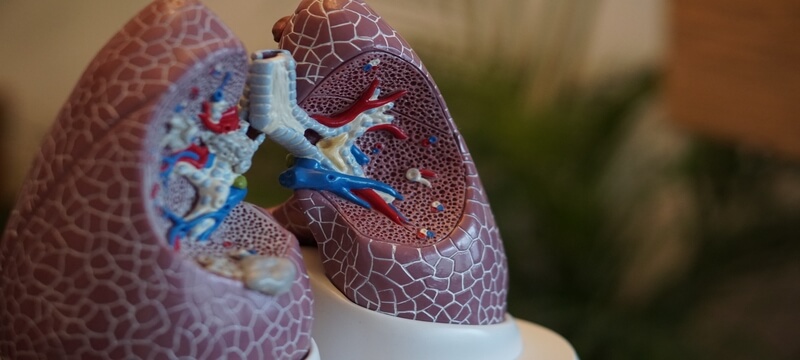
Asthma can be a debilitating condition for many. Those who suffer from it know that something as simple as a swim or run can lead to coughing, wheezing, and a tight chest. At worst, it could even cause an asthma attack. Living with asthma is not an easy feat – there is no cure, and sufferers are usually on various medications to control their condition. Luckily, with proper medical attention and treatment, you can manage asthma until the symptoms become insignificant. However, not all asthmatics are happy with the medication they have to take and are looking to more natural methods to help them live with their asthma, such as cannabidiol (CBD). While studies show that CBD has a range of potential benefits, can you actually use CBD for asthma?
Before we discuss whether CBD oil can help people with asthma, there are a few things you need to know about the condition first.
Table of Contents
What is asthma?
Asthma is a common chronic respiratory condition that begins with inflammation and swelling in your airways, along with the production of excess mucus. Your airways narrow and become clogged with mucus, making breathing difficult, resulting in coughing, shortness of breath, and wheezing.
Types of asthma
There are several types of asthma, namely:
- Adult-onset asthma: Also known as late-onset asthma, this is when you are diagnosed with asthma as an adult
- Allergic asthma: Asthma triggered by allergens
- Difficult asthma: People that suffer from this form experience frequent asthma attacks and need to use their asthma pump more than three times a week, even if they are on high doses of asthma medication
- Exercise-induced bronchoconstriction (EIB): Some people who aren’t diagnosed with asthma can experience asthma-like symptoms when exercising. While also known as exercise-induced asthma, a better term is exercise-induced bronchoconstriction (EIB), as the narrowing of the airways is not caused by asthma
- Non-allergic asthma: This asthma is not triggered by allergens and usually develops later on in life. It also tends to be more severe than allergic asthma
- Occupational asthma: Usually linked to allergic asthma, occupational asthma is directly caused by your work, and symptoms typically improve when you are not at work. For example, if you work in a veterinary clinic, you may be allergic to animal dander
- Paediatric (childhood asthma): This is when you are diagnosed with asthma as a child, but find it disappears entirely as you get older. Depending on the severity, it may return later in life
- Seasonal asthma: This is asthma that only flares up during certain times of the year, such as hay fever season.
- Severe (‘brittle’) asthma: As its name suggests, this is an extreme form of asthma. Sufferers have asthma attacks a few times a year and are on powerful medication
While it may be difficult to classify your specific type of asthma, knowing which one you have can go a long way in helping you manage your condition. Everyone experiences it differently, which is why it is vital that you never self-diagnose. Instead, see your doctor to find out more about your condition and how to treat it.
What are the symptoms of asthma?
While everyone is unique and experience their asthma differently, the most common symptoms of asthma are:
- Breathlessness
- Coughing
- Shortness of breath
- Tight chest
- Wheezing
If it feels like your symptoms are getting worse, you may be having an asthma attack. The symptoms of an asthma attack are:
- Faster breathing
- Extreme breathlessness to the point where you can’t speak, eat or sleep
- Worsening symptoms
- Blue lips or fingernails
- Your inhaler isn't helping or providing relief
- Your peak flow is lower than usual
If you feel like you are having an asthma attack, try your best not to panic and follow the following steps:
- Sit upright and try taking slow, steady breaths
- Use your inhaler – take a puff of your reliever inhaler every 30 to 60 seconds (up to 10 puffs)
- If you find yourself without an inhaler, or if it isn't working, call 112 or 999 for an ambulance
- If the ambulance is taking long, repeat step two
You must take an asthma attack seriously. If you don’t get the proper treatment you need, you can die.
Treatments for asthma
As mentioned previously, there is no cure for asthma, but you can manage the symptoms effectively with the proper lifestyle and treatment. The primary treatment for asthma is inhalers. These devices pump out medicine when pressed, which you breathe in. Depending on the severity of your asthma, your doctor may prescribe tablets and other treatments as part of your action plan.
While we strongly advise you to avoid any so-called treatment or product that claims to ‘cure’, some natural methods help ease some symptoms of the condition, helping support and maintain your overall health. As mentioned above, one of the most popular ones is CBD. Now that we’ve discussed asthma in full, we can look at CBD oil and asthma.
Does CBD oil help with asthma?
When treating asthma, you need to take a multi-faceted approach. One approach that has been met with positive reviews from users is CBD.
While asthma medication is critical, especially preventative inhalers, they cause a few unpleasant side effects such as sore throat and throat infections. Furthermore, other asthma medications, such as zileuton, have been linked to increased risk of depression and suicidal thoughts.
The side effects of these necessary medications need to be managed as well. This is where CBD comes in. An increasing number of studies show evidence that CBD can ease some of these symptoms, such as inflammation, spasms and anxiety, and may also lower the frequency and severity of flare-ups. However, these are preclinical studies, and much more research is needed before this can be confirmed. While results from these studies are promising, we cannot stress enough that CBD is not a substitute for asthma treatments nor a ‘cure'.
Studies on CBD and anxiety
Certain asthma medications can trigger anxiety, which can significantly impact day-to-day life and add even more problems to a patient's life. A number of studies on the effects CBD has on anxiety show evidence that CBD may relieve symptoms associated with anxiety thanks to its anxiolytic properties. For example, during a study done on rats in 2019, scientists observed that the rats who had been given CBD showed lower signs of anxiety and their increased heart rate improved.
An older study, from 2011, researched CBD’s effects on people with social anxiety disorder (SAD). Subjects were given 400 mg of CBD orally or a placebo. Those who took CBD experienced reduced anxiety levels compared to those who took the placebo.
These studies show that CBD oil could potentially prevent anxiety caused by your prescribed asthma medication.
However, it is essential to keep in mind that CBD interacts with some prescription medications, so we strongly advise you to get medical advice before using CBD oil for asthma.
Studies on CBD and inflammation
Asthma flare-ups are mainly caused by inflammation in the lungs. The immune system produces an inflammatory response when an asthmatic is exposed to irritants such as allergens, leading to muscle spasms and excess mucus. This clogs the respiratory airways and makes it very difficult to breathe.
Fortunately, some studies show evidence that CBD can relieve inflammation, such as a study in the European Journal of Pharmacology which found that CBD may inhibit the inflammatory response in patients with allergic asthma.
Studies on CBD and muscle spasms
You may be wondering: does CBD oil help with shortness of breath? To answer this question, we need to discuss muscle spasms that occur in the midst of an asthma attack. During an asthma attack, patients experience spasms caused by muscle contractions in the lungs, which leads to wheezing and difficulty breathing.
According to various studies, CBD helps alleviate muscle spasms which can help open airways, making it easier for asthmatics to breathe. If we consider these studies, then yes, CBD may potentially help with shortness of breath.
How to take CBD for asthma
Cannabidiol can be taken in several ways, such as CBD oil, capsules and edibles. Let’s take a look at what the various methods entail.
CBD oil
CBD oil is available in various flavours and strengths. It can be taken sublingually by putting a few drops of oil under your tongue and keeping it there for about 1 minute before swallowing. It will absorb into the bloodstream, bypassing the liver, which is why the effects are noticeable quickly after use.
Alternatively, you can put a few drops in food or drinks if you don't like the taste of the oil by itself. However, it will take longer for you to feel the effects.
CBD capsules
Capsules containing CBD are useful if you live a busy lifestyle and want a fixed dosage without measuring out drops like you would with oil. CBD capsules have a lower bioavailability than CBD oil, as they first need to pass through the liver, which means it takes longer for the effects of CBD capsules to kick in. However, the effects tend to last longer.
CBD edibles
Edibles are quickly surpassing the popularity of CBD oil, thanks to the variety and novel products on the market. Edibles include anything from CBD gummies to chocolate, and are an excellent way for first-time users to start taking CBD. Like capsules, edibles such as gummies provide accurate dosing and need to pass the liver before entering the bloodstream.
How much CBD oil should I take for asthma?
It is uncertain how much CBD oil one should take for asthma. It all depends on factors such as your weight, age, and strength of the CBD oil you are using. We recommend starting low before working your way up to a higher dosage.
It’s always best to speak with your doctor before starting any supplement, including CBD.
Read more: CBD Dosage Guide – How much CBD Oil should you take?
Side effects of taking CBD
According to the World Health Organization (WHO), CBD is relatively safe for people to take. However, while side effects are rare, there is still a slight chance of minor side effects occurring, such as:
- Changes in appetite
- Diarrhoea
- Fatigue
- Weight changes
CBD can alter the metabolism of certain medications. Therefore, it is best to consult a doctor to discuss whether CBD poses a threat to your current asthma medication.
Key takeaways
While CBD oil is not clinically approved to treat asthma symptoms, results from studies regarding the effects of the cannabinoid on asthma are promising and suggest that it could help manage symptoms and decrease flare-ups.
That being said, more research is needed, especially on humans. Most research regarding CBD is done on rats. This is not accurate enough for us to know whether it will affect us in the same way.
We cannot stress enough that CBD oil is not a treatment or cure for asthma. Never use it in place of asthmatic medicines. Instead, consult a medical professional to discuss your options and see whether you can use CBD oil in conjunction with your current treatments.
You may also like to read: CBD Oil for Arthritis: Can it help with easing of Pain?





